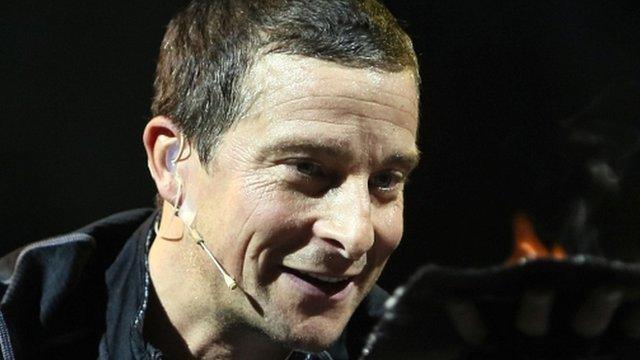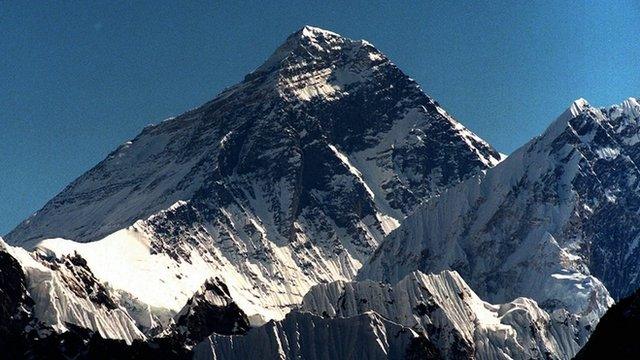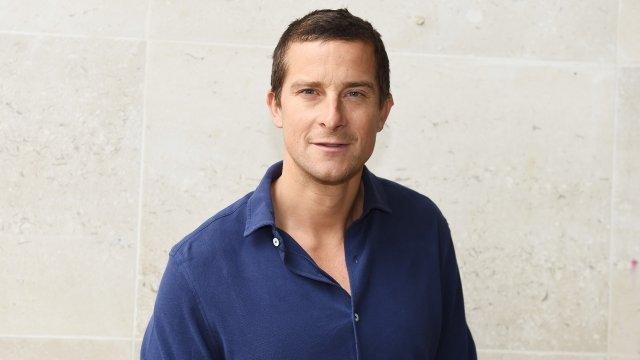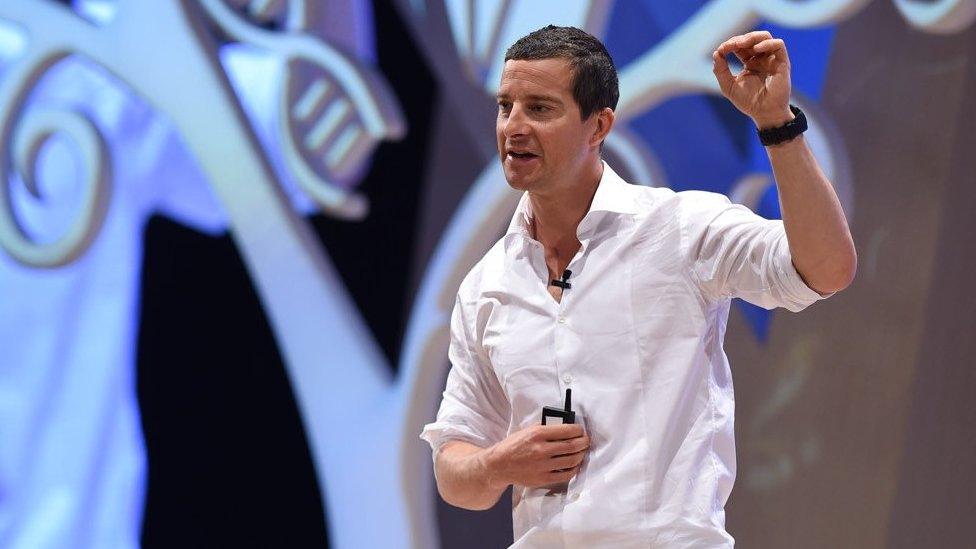What really makes Bear Grylls afraid?
- Published

Bear Grylls might be confident about climbing mountains, wrestling alligators and challenging the wilderness to do its venomous worst - but there's one thing that fills him with horror.
Cocktail parties full of strangers.
"We all have fears. People say, 'You can't have any fears', but I'm scared of so many things," says the man who has what must be the best ever job description, of "adventurer".
"I'm really bad at cocktail parties with lots of people I don't know. I really genuinely am."
Maggots and steep rock faces are less daunting to him than unarmed combat with canapes and small talk.
Speaking at an international education conference, Grylls says he lacked confidence as a youngster and describes his own approach to tackling fear and those nagging self-doubts.
"I've learned that the best way over our fears is right bang through the middle. It really is. The only way you don't see the fear is when you're right on it.
"I've learned this the hard way. It's how I deal with it now," he said at the Global Education and Skills Forum in Dubai.

Climbing Everest became a focus for the adventurer's recovery from back injuries
He says he is also "really nervous" of jumping out of aeroplanes, which is understandable since in his 20s he broke his back in three places in a parachuting accident in Africa.
His recovery from this injury became the springboard for his later ambitions - setting the target of climbing Everest and giving him the fire in his belly to make the most of this "second chance" in life.
"It was definitely a dark time after that accident.
"My over-riding emotion was that I really have got lucky. I should either be dead or paralysed. There's got to be some purpose behind this. Life has given me a second chance.
"I might be a bit crook and a bit scarred, but I'm OK and I'm really going to claw my way back - and I really want to do something with my life.
"Sometimes in life it takes a knock to remember what we really value."


There probably isn't a pamphlet in the careers office for people wanting to become adventurers.
But Grylls has a straightforward explanation for the path he took - and the occupational hazard of constantly putting himself in danger.
"It's the only thing I'm good at. I'm not saying that out of modesty, it really is. It's my job, it's what I really love. It's what over the years I've become half-decent at."
And he says the parachute accident was another spur to improve and get things right in split-second decisions.
When his parachute was failing to function properly and he was spinning to the ground, he says he wasn't thinking about his life flashing before his eyes - instead he was trying to sort out the parachute.

More stories from the BBC's Global education series, external looking at education from an international perspective, and how to get in touch.
You can join the debate at the BBC's Family & Education News Facebook page, external.

But he "ran out of time and hit the ground very hard" and says that, in retrospect, he should have used those seconds to use the reserve chute.
"I made a promise to myself on that hospital bed that I was going to become the fastest-thinking, the quickest-reaction dude out there. Now I really take pride that I'm good in those moments. But these are skills we develop."

"Sometimes in life it takes a knock to remember what we really value"
He is famous for his survival skills. But he says the first inhospitable terrain he had to conquer was his own lack of self-confidence.
"I wasn't very good at school - and I struggled a lot with confidence," says the Eton-educated adventurer.
But he says such early struggles can be better preparation than success coming too easily.
"The great people I know in life often struggled at school, because it was the struggle that developed their strength."
His descriptions are also punctuated by an awareness of the small margins between success and failure - and life and death.
When he talks about the last exhausting phase of climbing Everest, he describes coming across the body of another climber he had known, Rob Hall, who had died on the mountain two years before.
"I remember just sitting next to Rob, still perfectly there, his hair blowing, as if I could nudge him and he'd stand up and be fine.
"I desperately needed something to give me strength - and he is such a hero of mine. I just remember this panic filling me - there are a lot of bodies on the mountain, but this was different - we were so close, but now so far away."
He pushed on and became one of the youngest climbers to get to the summit of Everest.
And he says he brought back some snow from the summit and kept it as a liquid symbol of conquering his self-doubt.

Bear Grylls says young people need some risk in their lives
Grylls's popularity as a TV presenter has been based on his Boy's Own adventures in the world's wild places. It's in contrast to the worries about young people spending too long in front of screens, missing out on exercise and stressing over social media.
He says young people need to see the outdoor world and to experience risk in their lives to build a spirit of adventure and curiosity.
"If you strip risk out of young people's lives, you kill that spirit. Risk is all around us - and you empower kids if you teach them how to manage that risk."
And he says it's the shy and under-confident youngsters he wants to encourage most.
"The rewards in life don't always go to the biggest or the bravest, the cleverest, or even the best," he tells them.
"The rewards in life go to the dogged and the determined, to the tenacious, those who get back on their feet when they get kicked."
He's prepared for numbingly cold temperatures and the threats of hungry predators.
Just don't try and ambush him with a cocktail sausage and a conversation about the traffic.